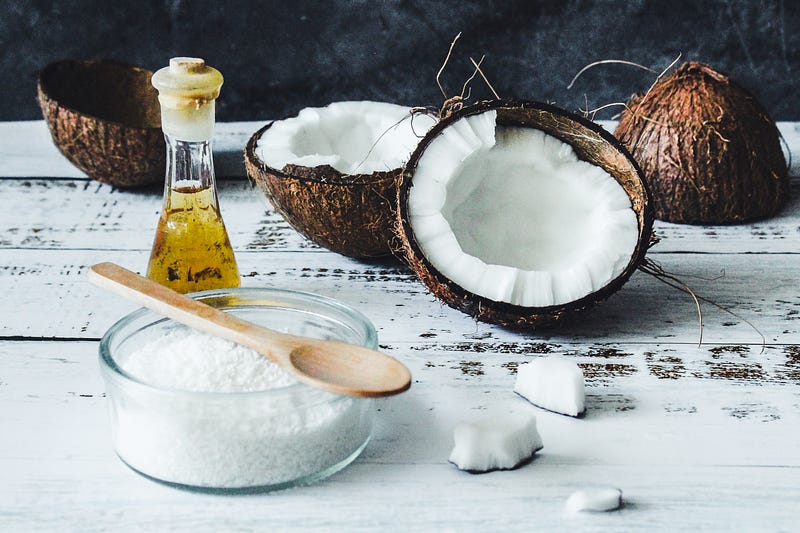Understanding Coconut Oil: Nutritional Insights and Health Impacts
Written on
Chapter 1: The Rise of Coconut Oil in Diets
Coconut oil has gained immense popularity as an ingredient in various plant-based food products, such as meat substitutes, dairy alternatives, and more. Despite its high saturated fat content, which ranges from 90% to 92%, it's often marketed as a "functional food." A key component of coconut oil is medium-chain triglycerides (MCTs), particularly lauric acid, which constitutes roughly 50% of its total fat.
Unrefined, or virgin coconut oil, is rich in polyphenols and vitamin E, making it a source of antioxidants. This oil has been associated with benefits for weight management, heart health, skin conditions, and cognitive function. As vegan diets become more prevalent, coconut oil finds its way into many formulations, not necessarily due to its endorsement by veganism, but because of its ability to mimic the properties of animal fats. In some Asian cultures, rice is even cooked with coconut oil.
However, it is essential to discuss the health benefits of coconut oil with nuance. This article aims to provide insights based on recent scientific reviews regarding coconut oil's effects on:
- Blood lipid profiles: examining cardiovascular health
- Glucose and insulin responses: assessing diabetes risk
- Body fat: evaluating weight loss
- Inflammation levels: determining health impacts

Section 1.1: Blood Lipid Profiles
A recent meta-analysis encompassing 16 human studies revealed that consuming coconut oil for over two weeks leads to an increase in both LDL and HDL cholesterol levels—specifically, LDL by an average of 10.47 mg/dL and HDL by 4.00 mg/dL when compared to non-tropical vegetable oils like soybean, olive, safflower, and canola oils.
Interestingly, when compared to palm oil, coconut oil raised LDL cholesterol by 20.50 mg/dL and HDL by 2.83 mg/dL. The rise in both types of cholesterol can be attributed to the high lauric acid content in coconut oil. While MCTs generally promote fat oxidation, lauric acid behaves more like a saturated fatty acid biologically. It has long been known to stimulate cholesterol synthesis, making it surprising that coconut oil also prompts a higher increase in cholesterol synthesis compared to palm oil.

Section 1.2: Glucose and Insulin Responses
A separate meta-analysis, which included six human studies, demonstrated that incorporating coconut oil into carbohydrate-rich meals led to a 10% increase in post-meal glucose levels, along with a 12% reduction in post-meal insulin levels compared to meals without oil or those using vegetable oils. This reduction in insulin allows glucose to circulate in the bloodstream longer, posing potential risks to vascular health.
Furthermore, the same analysis indicated that consuming coconut oil for more than ten days did not significantly alter fasting glucose or insulin levels. While there is some evidence suggesting a rise in insulin resistance, there was no notable impact on the function of beta-cells (the cells responsible for insulin secretion). Although the number of studies reviewed was limited, it raises questions about the purported benefits of coconut oil for glucose control.

Chapter 2: Evaluating Body Fatness and Inflammation
The first video titled "The major benefits of coconut oil" provides insights into the various health claims associated with coconut oil.
The second video, "A nutritionist breaks down the possible health benefits of coconut oil," offers a detailed analysis of coconut oil's nutritional aspects.
Section 2.1: Body Fatness and Weight Loss
A meta-analysis involving eight human studies concluded that coconut oil has no significant effect on weight loss compared to other vegetable oils. Most studies consistently indicated that coconut oil supplementation does not promote weight loss, with only one study showing a notable reduction in body weight. Thus, adding coconut oil to a calorie-restricted diet may not facilitate weight loss and could even impede it if total caloric intake increases.

Section 2.2: Inflammation Status
Research on the effects of coconut oil on inflammation in humans is limited. Various studies may focus on different biomarkers of inflammation, which can lead to inconsistent findings. Generally, meals containing coconut oil may induce short-term inflammation as indicated by the hsCRP marker, similar to other high-fat foods. Over the long term, coconut oil's effects on inflammation are comparable to those of other oils.
Summary: Key Takeaways
Coconut oil is indeed rich in polyphenols and vitamin E, which aid in delivering fat-soluble vitamins. While the media often heralds coconut oil as a "functional food," it frequently overlooks its cholesterol-raising potential and high saturated fat content. The primary MCT in coconut oil, lauric acid, has been shown to enhance cholesterol synthesis.
Moreover, coconut oil does not contribute to weight loss, improve glucose regulation, or reduce inflammation more effectively than other vegetable oils. For individuals with high cholesterol, coconut oil may not be an advisable substitute for vegetable oils or animal fats.
Nevertheless, other shorter-chain MCTs, such as caprylic and capric acids (which make up about 13% of coconut oil), exhibit properties more akin to "true" MCTs. These are less likely to contribute to cholesterol synthesis and more involved in ketogenesis. However, their potential benefits may be overshadowed by the higher lauric acid and saturated fat content in coconut oil.
In summary, using coconut oil in vegan meat alternatives does not offer any superior benefits compared to animal fats regarding heart health, glucose management, weight control, and inflammation.
